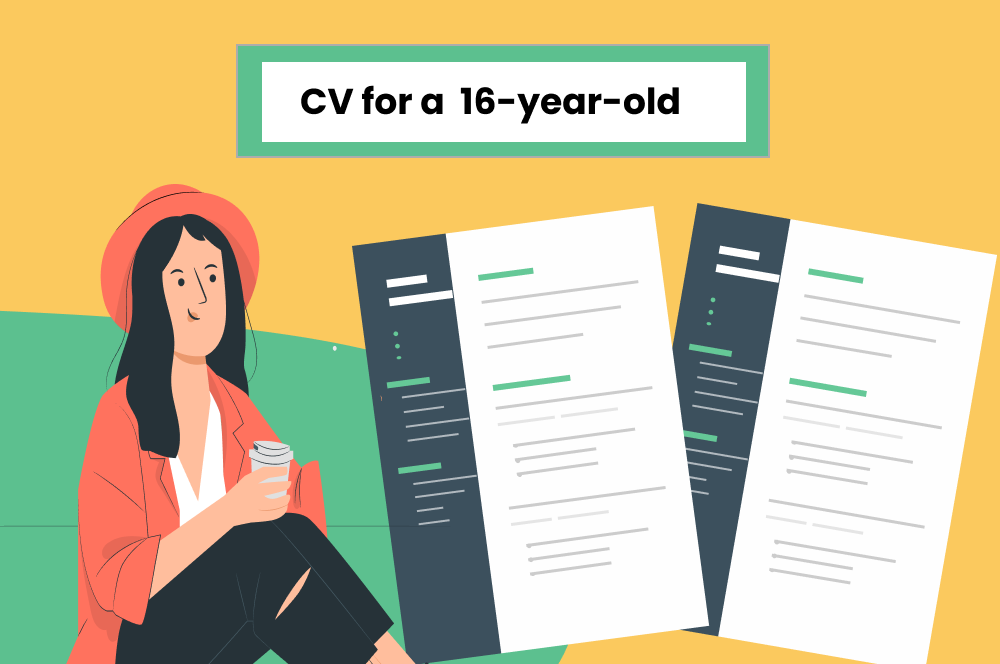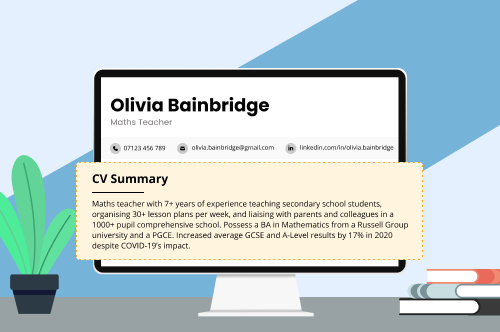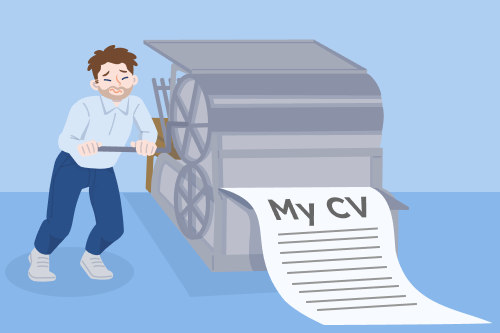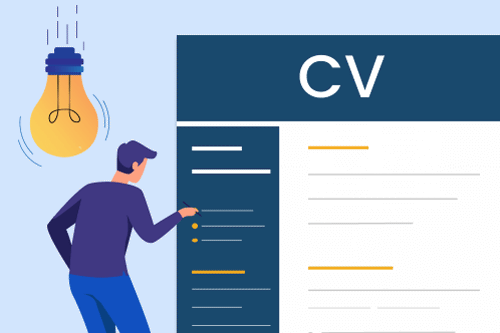At the age of 16, you can leave school, which means you can start looking for part-time jobs if you live in England and full-time jobs if you live in Scotland, Wales, Northern Ireland, and Ireland.
But once you know what teen job you’d like to do, you’ll need a professional CV that outlines your skills and career interests.
Below are six CV examples for 16-year-olds you can look at for inspiration and expert tips to help you through the process.
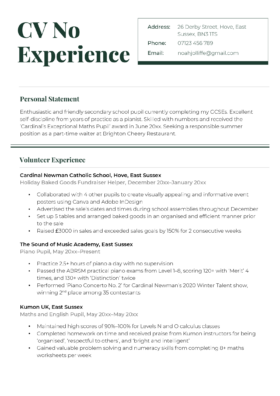
No Work Experience
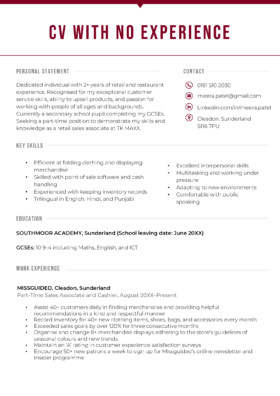


With Work Experience
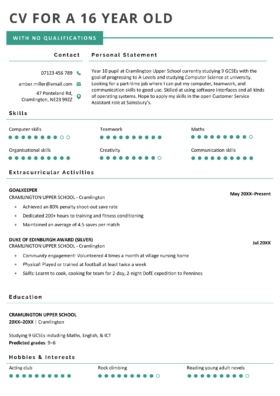


No Qualifications
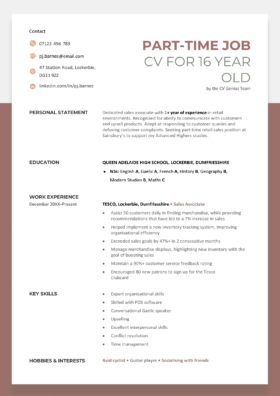


Part-Time Job
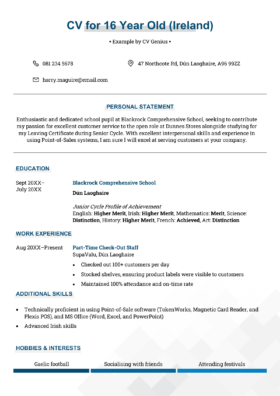


CV for Ireland
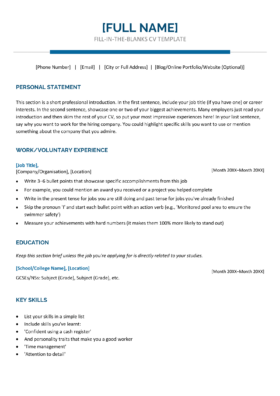


Blank CV
Want a closer look at these examples? Simply click on a link:
- No work experience CV
- Some work experience CV
- No qualifications CV
- Part-time job CV
- CV for Irish 16 year olds
- Fill-in-the-blanks template
Or watch the video below, and we’ll walk you through the process of creating your very own CV from scratch:
CV examples for a 16-year-old
Here are some CV outline examples that you can look at and download to reference when you write your CV:
1. CV example for a 16-year-old with no experience
Unsure how to write a CV with no experience? Here’s how: talk about your extracurricular activities and voluntary work instead.
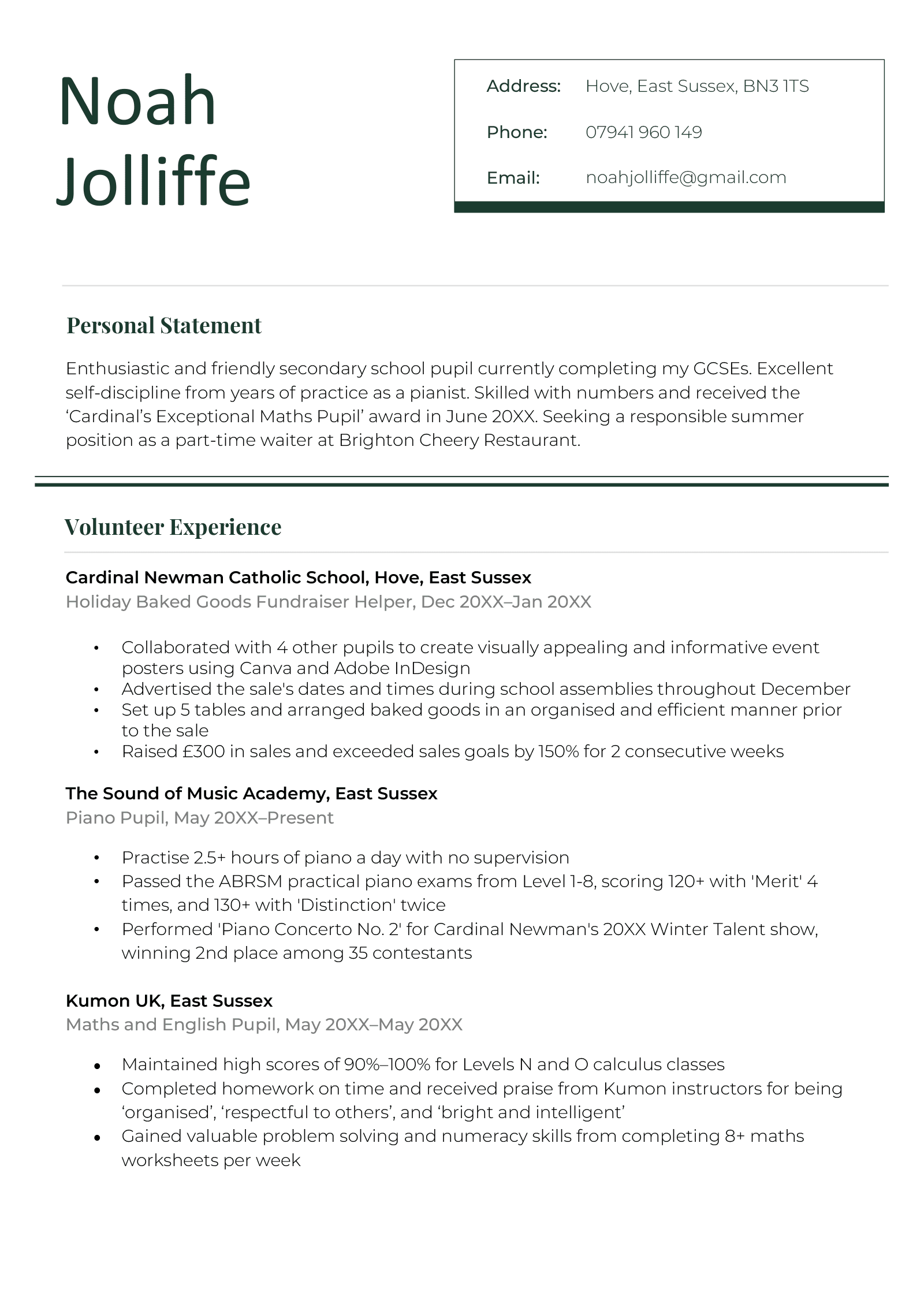
Copy and Paste Text Version
PERSONAL STATEMENT
Enthusiastic and friendly secondary school pupil currently completing my GCSEs. Excellent self-discipline from years of practice as a pianist. Skilled with numbers and received the ‘Cardinal’s Exceptional Maths Pupil’ award in June 20XX. Seeking a responsible summer position as a part-time waiter at Brighton Cheery Restaurant.
VOLUNTEER EXPERIENCE
Cardinal Newman Catholic School, Hove, East Sussex
Holiday Baked Goods Fundraiser Helper, Dec 20XX–Jan 20XX
- Collaborated with 4 other pupils to create visually appealing and informative event posters using Canva and Adobe InDesign
- Advertised the sale’s dates and times during school assemblies throughout December
- Set up 5 tables and arranged baked goods in an organised and efficient manner prior to the sale
- Raised £300 in sales and exceeded sales goals by 150% for 2 consecutive weeks
The Sound of Music Academy, East Sussex
Piano Pupil, May 20XX–Present
- Practise 2.5+ hours of piano a day with no supervision
- Passed the ABRSM practical piano exams from Level 1–8, scoring 120+ with ‘Merit’ 4 times, and 130+ with ‘Distinction’ twice
- Performed ‘Piano Concerto No. 2’ for Cardinal Newman’s 20XX Winter Talent show, winning 2nd place among 35 contestants
Kumon UK, East Sussex
Maths and English Pupil, May 20XX–May 20XX
- Maintained high scores of 90%–100% for Levels N and O calculus classes
- Completed homework on time and received praise from Kumon instructors for being ‘organised’, ‘respectful to others’, and ‘bright and intelligent’
- Gained valuable problem solving and numeracy skills from completing 8+ maths worksheets per week
EDUCATION
Cardinal Newman Catholic School, Hove, East Sussex (School leaving date: June 20XX)
GCSEs:
- Maths (9)
- English Lit. (8)
- English Lang. (9)
- French (7)
- German (7)
- Biology (8)
- Chemistry (8)
- Physics (9)
- Geography (5)
- ICT (7)
KEY SKILLS
- Experienced with social media platforms: Instagram, YouTube, TikTok
- Comfortable with Microsoft Word, Excel, and PowerPoint
- Proficient with Windows and Mac programs
- Quick with numbers and calculations
- Excellent interpersonal skills
- Organisational skills
- Time management
HOBBIES & INTERESTS
- Amateur guitar player
- Football
- Photography
- Reading sci-fi and fantasy novels
2. Example CV for a 16-year-old with some experience
You’ll have an easier time writing a CV if you have some work experience. Just make your work experience section the most prominent part of your CV.
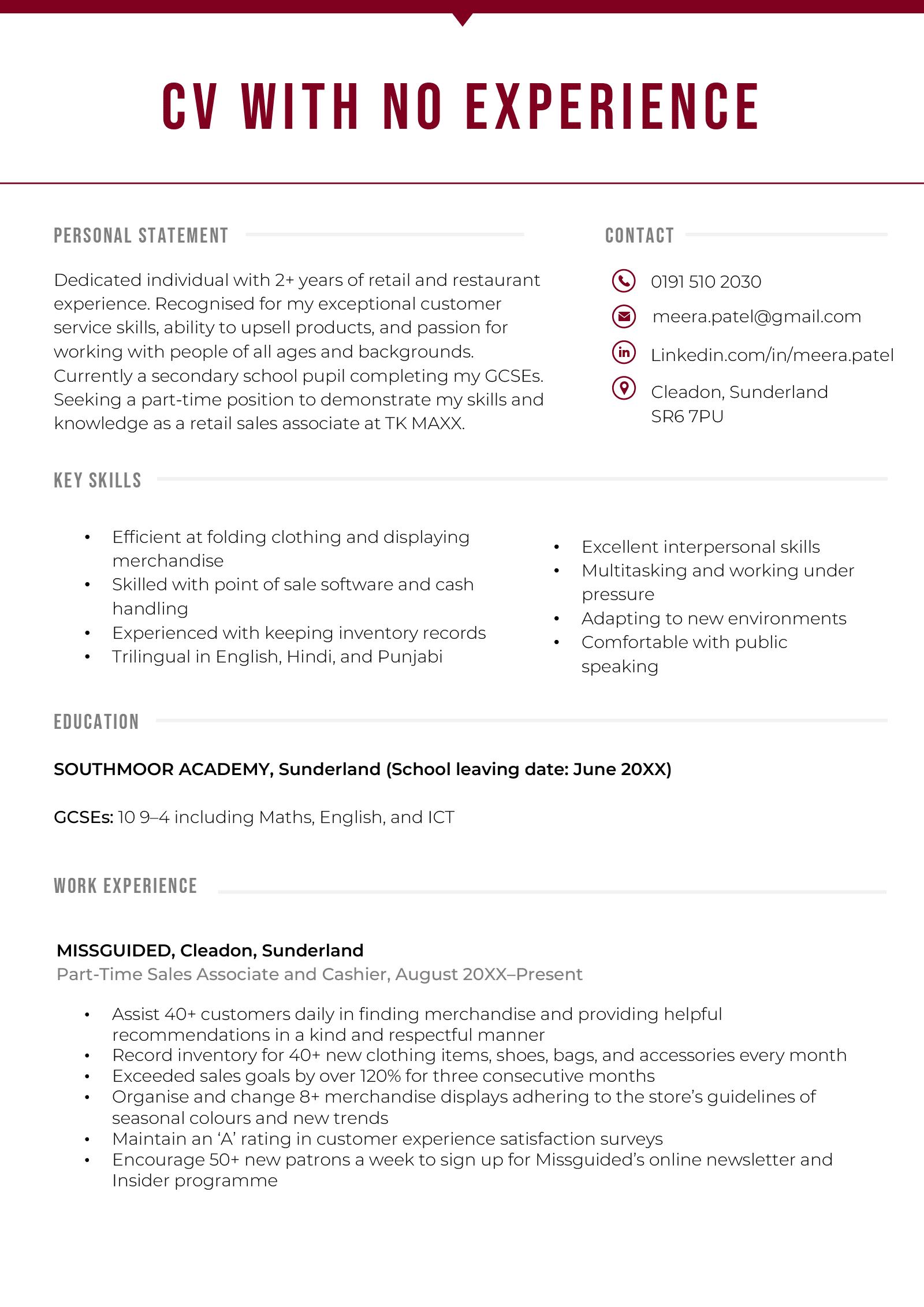
Copy and Paste Text Version
PERSONAL STATEMENT
Dedicated individual with 2+ years of retail and restaurant experience. Recognised for my exceptional customer service skills, ability to upsell products, and passion for working with people of all ages and backgrounds. Currently a secondary school pupil completing my GCSEs. Seeking a part-time position to demonstrate my skills and knowledge as a retail sales associate at TK MAXX.
KEY SKILLS
- Efficient at folding clothing and displaying merchandise
- Skilled with point of sale software and cash handling
- Experienced with keeping inventory records
- Trilingual in English, Hindi, and Punjabi
- Excellent interpersonal skills
- Multitasking and working under pressure
- Adapting to new environments
- Comfortable with public speaking
EDUCATION
SOUTHMOOR ACADEMY, Sunderland (School leaving date: June 20XX)
GCSEs: 10 9–4 including Maths, English, and ICT
WORK EXPERIENCE
MISSGUIDED, Cleadon, Sunderland
Part-Time Sales Associate and Cashier, August 20XX–Present
- Assist 40+ customers daily in finding merchandise and providing helpful recommendations in a kind and respectful manner
- Record inventory for 40+ new clothing items, shoes, bags, and accessories every month
- Exceeded sales goals by over 120% for three consecutive months
- Organise and change 8+ merchandise displays adhering to the store’s guidelines of seasonal colours and new trends
- Maintain an ‘A’ rating in customer experience satisfaction surveys
- Encourage 50+ new patrons a week to sign up for Missguided’s online newsletter and Insider programme
BHADI’S CURRY HOUSE, Cleadon, Sunderland
Part-Time Waitress, June 20XX–August 20XX
- Greeted 200+ dining guests per week and seated them at their tables while making friendly conversation
- Set tables, took orders, assisted other staff, and cleaned up after meals efficiently during restaurants’ working hours
- Memorised Bhadi’s menu and recited recommendations and special discounts to new customers
- Operated point of sale system with 100% accuracy and helped other staff members by taking payments for their table guests during busy hours
THE WILSON FAMILY, Cleadon, Sunderland
Part-Time Nanny, May 20XX–June 20XX
- Prepared healthy snacks and drinks for 2 girls (aged 3 and 5) from Mondays to Wednesdays and supervised them while they ate
- Played educational and fun games using flashcards, stuffed animals, and dancing to help children learn the alphabet, basic numbers, colours, and animals
- Bathed and clothed children every night after dinner and read them a bedtime story
- Helped parents with light cleaning tasks such as hoovering, washing the dishes, and cleaning up tables and playing areas while the girls were napping
HOBBIES & INTERESTS
- Amateur photography
- Knitting scarves and hats for my friends and family
- Makeup and fashion
- Sewing and embroidery
Look at other CV examples to learn more about job requirements in different industries and get ideas for your CV.
3. CV example for a 16 year old with no qualifications
In this CV example, the applicant makes up for their lack of qualifications by filling out details about their extracurricular activities, including Duke of Edinburgh’s Award and their footie achievements:
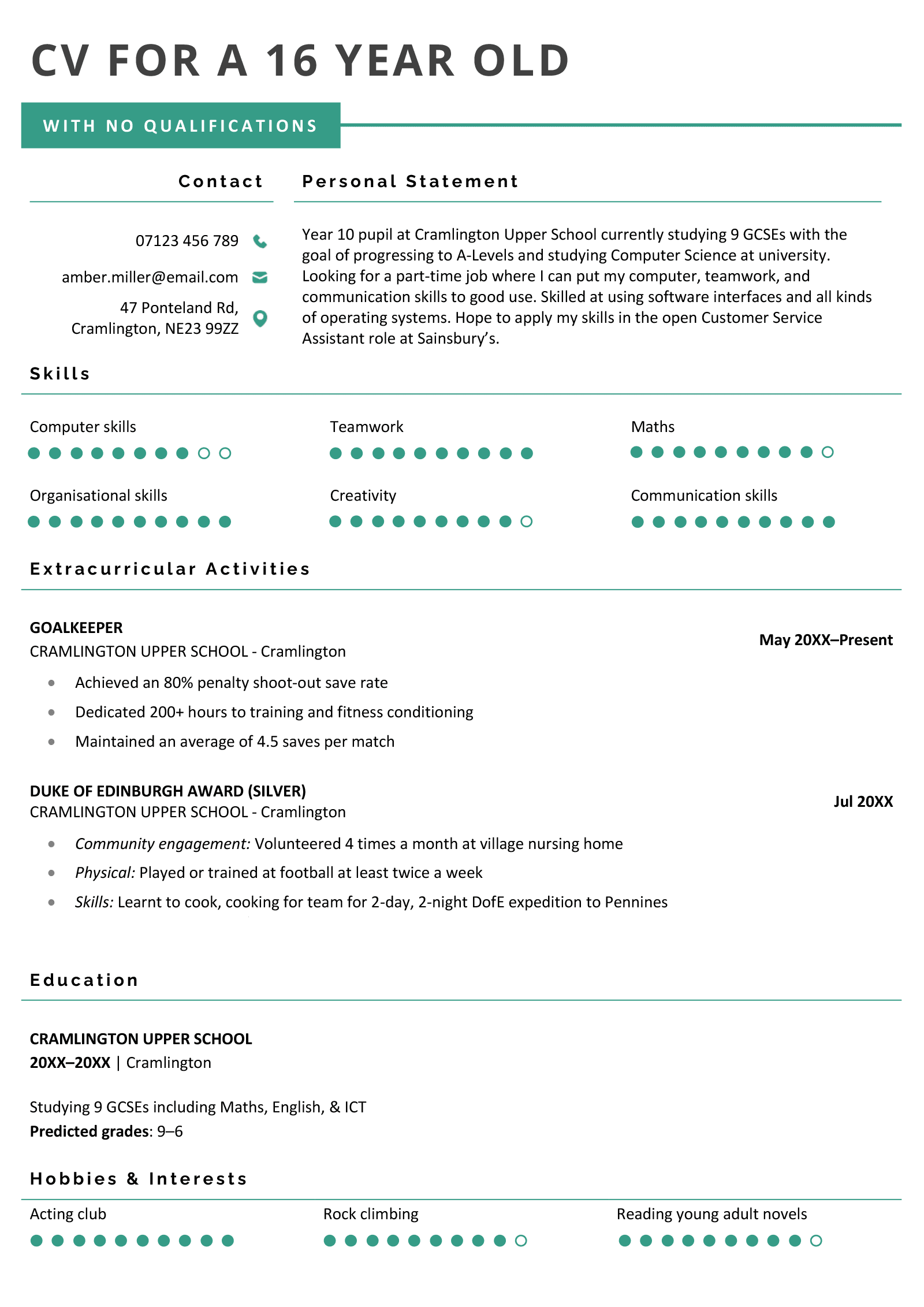
Copy and Paste Text Version
PERSONAL STATEMENT
Year 10 pupil at Cramlington Upper School currently studying 9 GCSEs with the goal of progressing to A-Levels and studying Computer Science at university. Looking for a part-time job where I can put my computer, teamwork, and communication skills to good use. Skilled at using software interfaces and all kinds of operating systems. Hope to apply my skills in the open Customer Service Assistant role at Sainsbury’s.
SKILLS
- Computer skills
- Organisational skills
- Teamwork
- Creativity
- Maths
- Communication skills
EXTRACURRICULAR ACTIVITIES
Cramlington Village Under 16s Football Team
Goalkeeper, May 20XX–Present
- Achieved an 80% penalty shoot-out save rate
- Dedicated 200+ hours to training and fitness conditioning
- Maintained an average of 4.5 saves per match
Duke of Edinburgh Award
Silver Award, Jul 20XX
- Community engagement: Volunteered 4 times a month at village nursing home
- Physical: Played or trained at football at least twice a week
- Skills: Learnt to cook, cooking for team for 2-day, 2-night DofE expedition to Pennines
EDUCATION
Cramlington Upper School, Cramlington
Studying 9 GCSEs including Maths, English, & ICT
Predicted grades: 9–6
HOBBIES & INTERESTS
- Acting club
- Rock climbing
- Reading young adult novels
4. CV for 16 year old seeking a part-time job
This 16 year old is seeking a part-time job. Since they don’t have much work experience yet, they use a one-page CV:
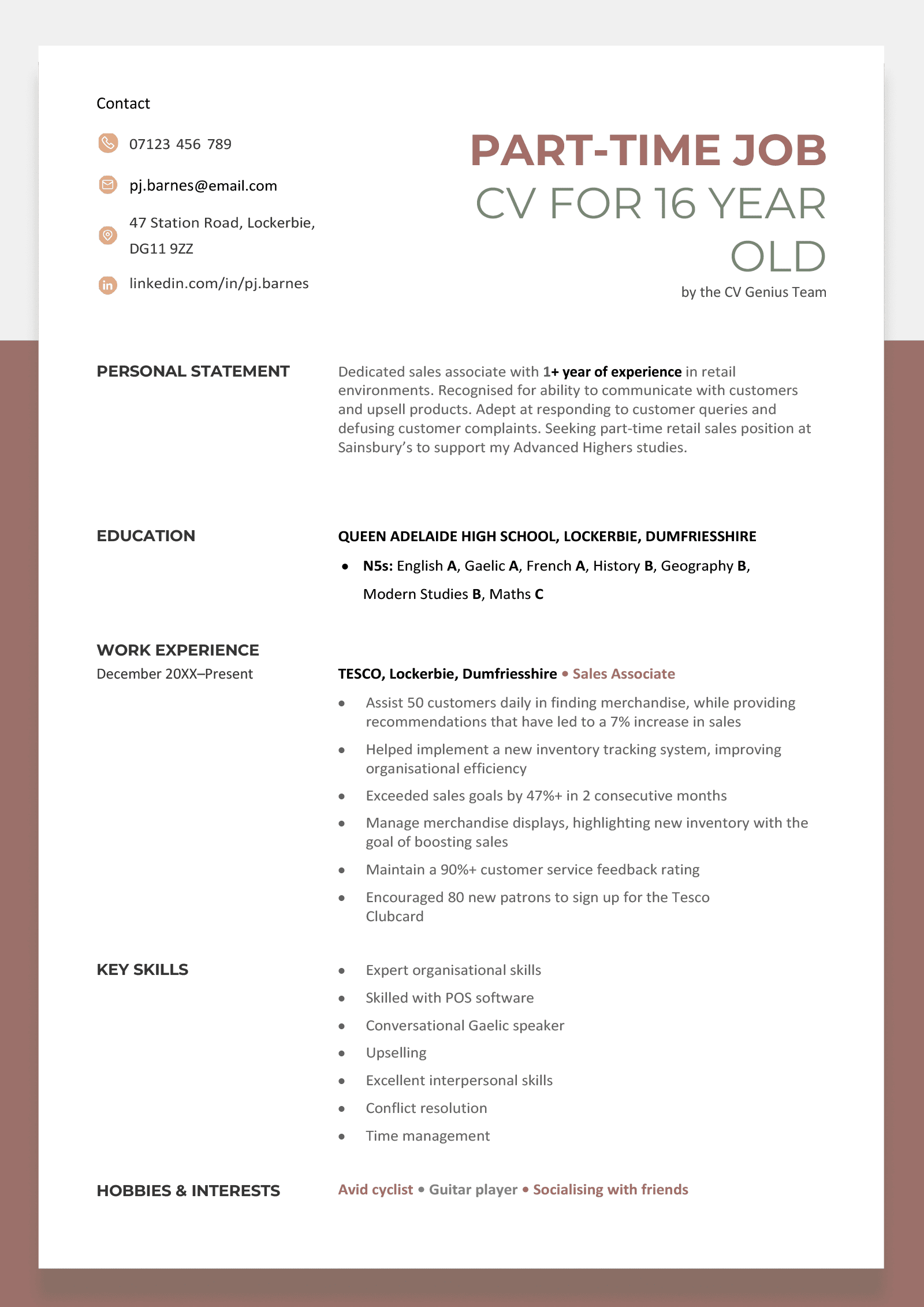
Copy and Paste Text Version
PERSONAL STATEMENT
Dedicated sales associate with 1+ year of experience in retail environments. Recognised for ability to communicate with customers and upsell products. Adept at responding to customer queries and defusing customer complaints. Seeking part-time retail sales position at Sainsbury’s to support my Advanced Highers studies.
EDUCATION
Queen Adelaide High School, Lockerbie
N5s: English (A), Gaelic (A), French (A), History (B), Geography (B), Modern Studies (B), Maths (C)
WORK EXPERIENCE
Tesco, Lockerbie
Sales Associate, December 20XX–Present
- Assist 50 customers daily in finding merchandise, while providing recommendations that have led to a 7% increase in sales
- Helped implement a new inventory tracking system, improving organisational efficiency
- Exceeded sales goals by 47%+ in 2 consecutive months
- Manage merchandise displays, highlighting new inventory to boost sales
- Maintain a 90%+ customer service feedback rating
- Encouraged 80 new patrons to sign up for the Tesco Clubcard
KEY SKILLS
- Expert organisational skills
- Skilled with POS software
- Conversational Gaelic speaker
- Upselling
- Excellent interpersonal skills
- Conflict resolution
- Time management
HOBBIES & INTERESTS
- Avid cyclist
- Guitar player
- Socialising with friends
5. CV for a 16 year old in Ireland
If you’re in Ireland, here’s what a good CV for getting a job will look like:
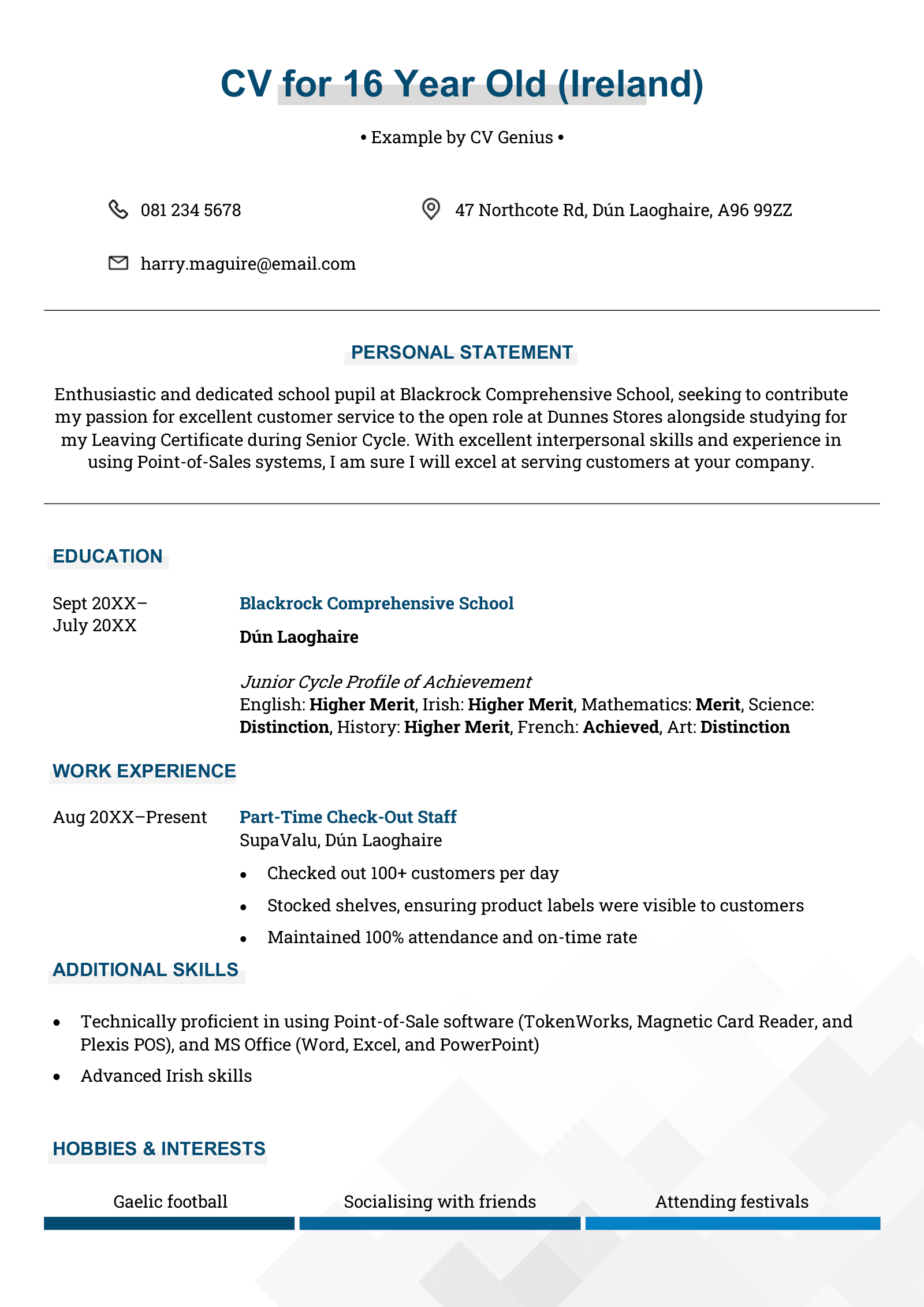
Copy and Paste Text Version
PERSONAL STATEMENT
Enthusiastic and dedicated school pupil at Blackrock Comprehensive School, seeking to contribute my passion for excellent customer service to the open role at Dunnes Stores alongside studying for my Leaving Certificate during Senior Cycle. With excellent interpersonal skills and experience in using Point-of-Sales systems, I am sure I will excel at serving customers at your company.
EDUCATION
Blackrock Comprehensive School, Dún Laoghaire
September 20XX–July 20XX
Junior Cycle Profile of Achievement
- English: Higher Merit
- Irish: Higher Merit
- Mathematics: Merit
- Science: Distinction
- History: Higher Merit
- French: Achieved
- Art: Distinction
SupaValu, Dún Laoghaire
Part-Time Check-Out Staff, August 20XX–present
- Checked out 100+ customers per day
- Stocked shelves, ensuring product labels were visible to customers
- Maintained 100% attendance and on-time rate
KEY SKILLS
- Technically proficient in using Point-of-Sale software (TokenWorks, Magnetic Card Reader, and Plexis POS), and MS Office (Word, Excel, and PowerPoint)
HOBBIES & INTERESTS
- Gaelic football
- Socialising with friends
- Attending festivals
6. Fill-in-the-blanks CV template for a 16 year old
Already know what you’d like to say? Download a fill-in blank CV template and fill it in — we’ve included instructions so you don’t run into any problems along the way.
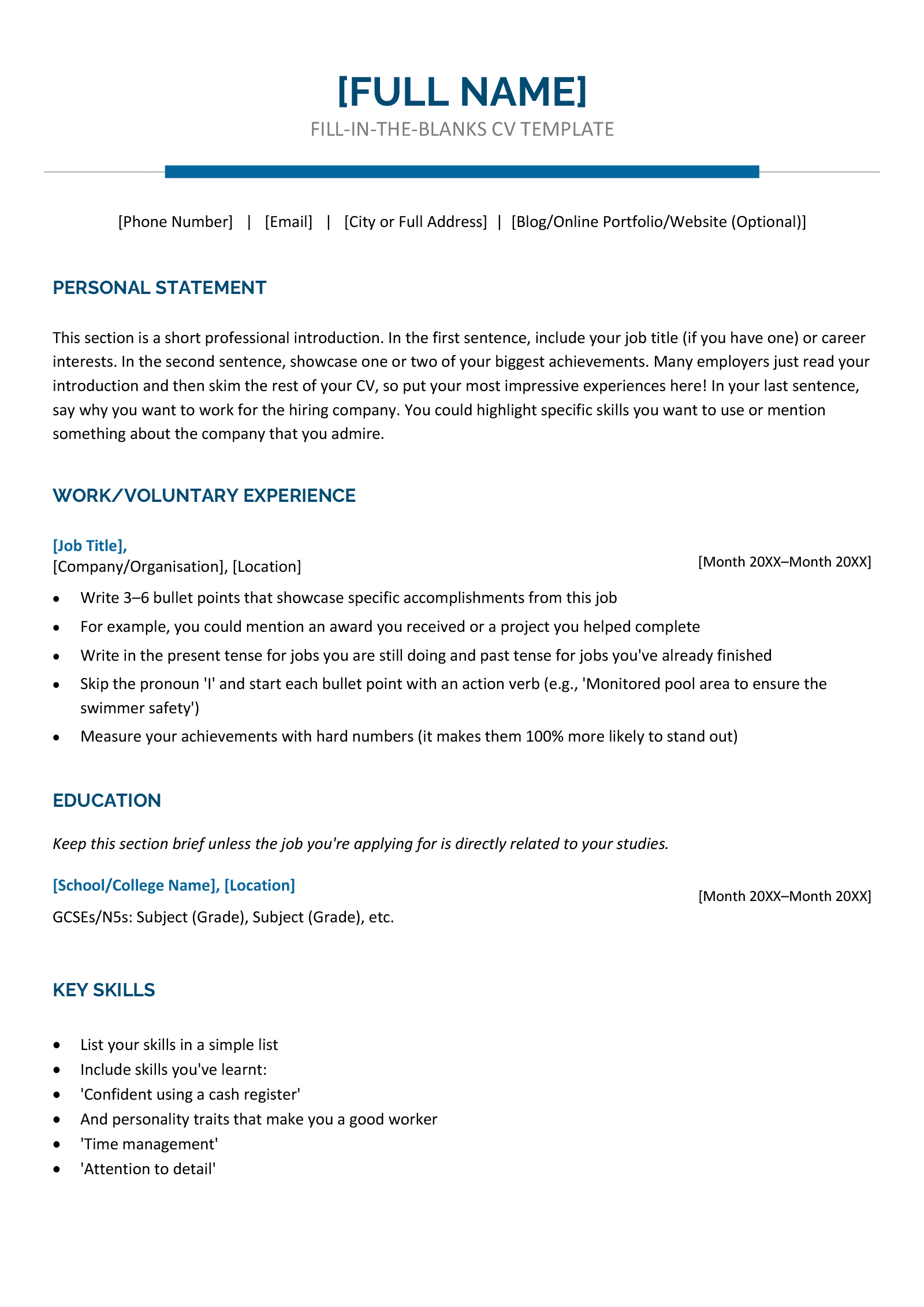
Copy and Paste Text Version
[FULL NAME]
Job Title
- [Phone Number]
- [Email]
- [Town/City + Postcode]
- [Blog/Online Portfolio/Website (optional)]
PERSONAL STATEMENT
This section is a short professional introduction. In the first sentence, include your job title (if you have one) or career interests. In the second sentence, showcase one or two of your biggest achievements. Many employers just read your introduction and then skim the rest of your CV, so put your most impressive experiences here! In your last sentence, say why you want to work for the hiring company. You could highlight specific skills you want to use or mention something about the company that you admire.
WORK/VOLUNTARY EXPERIENCE
[Job Title]
Company/Organisation, Location
Month 20XX–Month 20XX
- Write 3–6 bullet points that showcase specific accomplishments from this job
- For example, you could mention an award you received or a project you helped complete
- Write in the present tense for jobs you are still doing and past tense for jobs you’ve already finished
- Skip the pronoun ‘I’ and start each bullet point with an action verb (e.g., ‘Monitored pool area to ensure the swimmer safety’)
- Measure your achievements with hard numbers (it makes them 100% more likely to stand out)
EDUCATION
Keep this section brief unless the job you’re applying for is directly related to your studies.
[School/College Name], [Location]
GCSEs/N5s: Subject (Grade), Subject (Grade), etc.
KEY SKILLS
- List your skills in a simple list
- Include skills you’ve learnt:
- ‘Confident using a cash register’
- And personality traits that make you a good worker
- ‘Time management’
- ‘Attention to detail’
HOBBIES & INTERESTS
- Hobby that shows a work-relevant skill
- Work-relevant hobby
How to write a CV for a 16-year-old in the UK
If you’re 16 years old and allowed to leave full-time education, a good CV can help you make up for your lack of work experience by highlighting your skills and qualifications instead.
A good CV is also important because the UK minimum wage is lower for 16-year-olds than for adults. A high-quality CV could make employers consider starting you on a higher wage.
Here are four CV writing hacks for creating a standout CV as a 16-year-old:
1. Format your CV correctly
Recruiters have many CVs to choose from. Using the right CV format will show them that you’re a top candidate.
Follow these simple steps to improve your CV formatting:
- Use a professional template – save time fiddling with tricky design elements by using a preformatted CV template that’s already set up and ready to fill in.
- Choose one of 2024’s top CV fonts like Arial, Times New Roman, or Verdana — and keep your CV font size between 10.5 and 12 points to ensure employers can read your CV without straining their eyes.
- Use UK standard 2.5 cm margins. But if you’re trying to fit your details onto one page, try adjusting your margins to a minimum of 1.27 cm on all sides. White space helps with readability, and margins smaller than 1.27 cm will cause your CV to look too crowded.
- Use single or 1.5 line spacing so your CV text looks evenly spread out on the page.
- Save and submit your CV as a PDF or .docx file so your CV formatting stays the same no matter who views, downloads, or prints your application.
Or just make a CV online and get professional formatting automatically.
2. Include the right CV sections
As a 16-year-old, your CV should normally include the following sections:
- CV header
- Personal statement
- Work history, extracurricular projects, or volunteer experience
- Education details
- Key CV skills
- Hobbies and interests
Here’s what that CV structure looks like laid out:
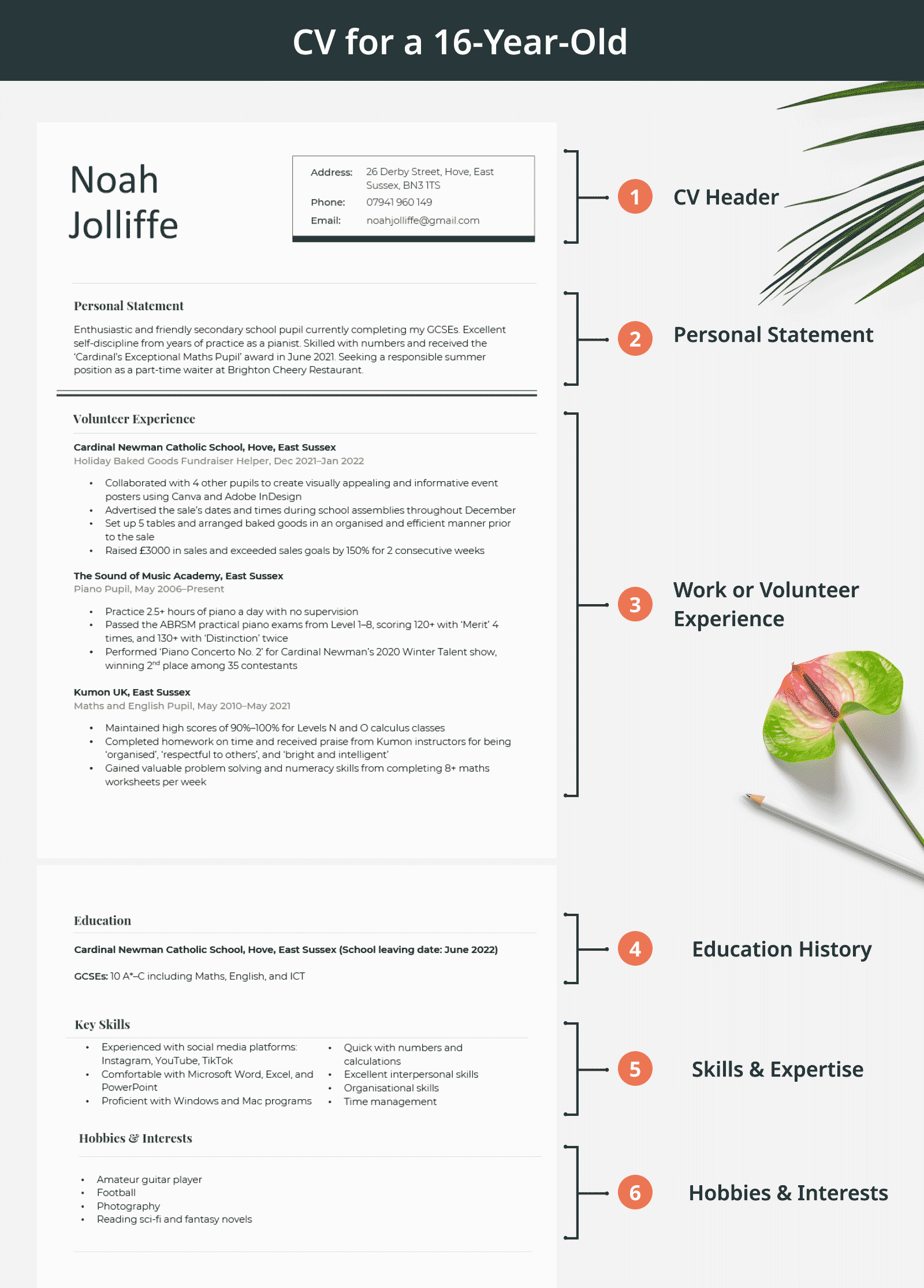

The ideal CV length is normally 2 pages, but writing a one-page CV for your first couple of jobs is fine.
3. Tailor your CV to the job advert
Determine the best achievements to put on your CV by reading the job advert carefully before you apply to a company. Check the main responsibilities and requirements (also known as keywords) outlined in the job description.
Then, include the keywords you find in your:
- CV personal statement
- work experience bullet points
- additional skills section
For instance, if a company says it’s looking for someone with ‘excellent people skills’, ensure you mention your people skills on your CV.
Adding the company’s name and your desired role at the end of your CV personal statement is also an effective way to target your CV.
For instance, a sentence like ‘Seeking a responsible position as a waiter’s assistant at Earl’s Cafe’ shows employers you’ve personalised your application for them.
4. Provide your references on a separate page
Employers want to know that you’re a hard worker who will succeed in the role, so prove you’re the right person for the job by preparing a list of professional referees.
Although you don’t typically need to provide your references until you’re at the interview stage, aim to find at least 1–3 referees, and include them on a separate page from your CV titled ‘Professional References’ or ‘List of Referees’.
Your referees should be people who:
- know you from an academic, volunteer, or professional setting
- understand your personality and work ethic
- can provide employers with reasons why you’re a great candidate
If you don’t have professional references, a trusted teacher, coach, or adult you’ve assisted will work as a referee. Just don’t forget to thank them for helping you!
Here’s how to list references on your CV:
Referee’s First and Last Name
Job Title
Phone Number
Relationship to Referee (e.g., form tutor)
When you list your referees, avoid including your family, friends, or people who don’t know you well, as their opinions of you may be biased — which could hurt your chances of getting the job.
Finally, there’s no need to include the expression ‘References Available Upon Request’ on your CV because it takes up valuable space, and employers will ask you for your references regardless.
If you plan on attending university and getting a part-time job or internship to support your living expenses, you’ll need to submit a good student CV with your next job application.
Frequently asked questions about CVs for 16 year olds
Here are some answers to frequently asked questions about CVs for 16 year olds:
1. How do you write a personal statement for a CV for a 16 year old?
To write a personal statement for your CV, focus on your skills, current career objective, and any relevant qualifications you have for the job. So you could write:
Innovative individual and self-taught Digital Artist with 8 GCSEs grades 9–4. Currently studying at Longhill High School. Passionate about 3D modelling and animation. Hoping to expand my knowledge of digital design by applying for a full-time internship with Flaneur Magazine after leaving school.
This example is good because it shows you don’t need any prior work experience to write a great CV personal statement.
When you’re ready to write your own, feel free to use this copy-paste template:
Fill-in-the-blanks personal statement
[Positive Adjective] individual and student at [School] with [#] GCSEs grades [Grade Range]. Passionate about [Interest] and [Interest]. Hoping to [Career Goal] by bringing my skills and enthusiasm to the [Job Title] role at [Employer].
2. Do you need a CV to get a job at 16?
Yes, you do need a CV to get a job at 16. Basically, at every age you need a CV to get a job. There are very few no-CV jobs out there unfortunately. Luckily, it’s easy to make a CV in minutes with an online CV builder. Most of them cost around £3 — so less than a third of a monthly Spotify subscription — and you can tailor them to your heart’s content to target different roles.
3. Why do you need a CV for a 16-year-old?
Employers use your CV to work out whether you’d be a good fit for their job opportunity.
Because most employers are very busy, they prefer to read a quick structured introduction that outlines your strengths, career goals, and any experience you have.
Fortunately, when you know how to write a CV (or have the right tools), making one can be quick and easy. And the little extra effort you put in will show the employer that you’re serious about the job and ready to take on new responsibilities.
Don’t forget you’ll need a cover letter too — employers in the UK and Ireland expect to see one alongside your CV so make the most out of your CV builder subscription and build a cover letter online too.
